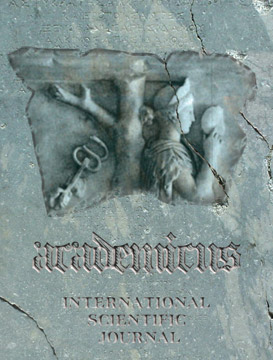Title:
CIitizen’s Basic Income - The new promise of Populism in the edge of Technological unemployment
Full Reference List:
| 1. | Migeotte, Léopold. The economy of the Greek cities: From the Archaic period to the early Roman Empire. Berkeley: Univ. of California Press, 2009. |
| 2. | Hornblower, Simon (2011). The Greek World: 479–323 BC (4 ed.). Abingdon: Routledge. |
| 3. | Foraboschi, Daniele. “The Hellenistic economy: indirect intervention by the state.” In Production and Public Powers In Classical Antiquity, edited by Elio Lo Cascio and Dominic Rathbone, Cambridge: Cambridge Philological Society, 2000. |
| 4. | Scheidel, Walter, Ian Morris, and Richard Saller, eds. The Cambridge economic history of the Greco-Roman world. Cambridge, UK: Cambridge Univ. Press, 2007. |
| 5. | Garnsey, P. (1989). Famine and Food Supply in the Graeco-Roman World: Responses to Risk and Crisis. History e-book project. Cambridge University Press. ISBN 978-0-521-37585-6. |
| 6. | Sullivan, E. D. S. (editor) (1983) The Utopian Vision: Seven Essays on the Quincentennial of Sir Thomas More San Diego State University Press, San Diego, California, ISBN 0-916304-51-5. |
| 7. | Berglar, Peter (2009). Thomas More: A Lonely Voice against the Power of the State. New York: Scepter Publishers. ISBN 978-1-59417-073-7. |
| 8. | Christ-von Wedel, Christine. Erasmus of Rotterdam: Advocate of a New Christianity (Toronto: University of Toronto Press, 2013). |
| 9. | Paine, Thomas (2004). Common sense [with] Agrarian justice. Penguin. ISBN 0-14-101890-9. |
| 10. | Kaye, Harvey J. (2005). Thomas Paine and the Promise of America. Hill and Wang. |
| 11. | Lamb, Robert (2010). “Liberty, Equality, and the Boundaries of Ownership: Thomas Paine’s Theory of Property Rights”. Review of Politics. |
| 12. | Nano, D., & Cani, S. (2013). The differences in students’ financial literacy based on financial education. Academicus, (8), 149. |
| 13. | Welfare and Health Services in the Nordic Countries: Consumer Choices. Nordic Council of Ministers. 2005. ISBN 9289312289. |
| 14. | Ewan McGaughey, ‘Will Robots Automate Your Job Away? Full Employment, Basic Income, and Economic Democracy’ (2018). |
| 15. | Bryce Covert, “What Money Can Buy: The promise of a universal basic income – and its limitations”. |
| 16. | John Lanchester, “Good New Idea: John Lanchester makes the case for Universal Basic Income”. |
| 17. | Paul O’Brien, Universal Basic Income: Pennies from Heaven, The History Press, 2017, ISBN 978 1 84588 367 6. |
| 18. | Clive Lord. A Citizens’ Income. John Carpenter, 2003. ISBN 1-897766-87-4. |
| 19. | Birnbaum, S. (2004). Real Libertarianism, Structural Injustice and the Democratic Ideal. Paper presented at the 10th Conference of Basic Income European Network, Barcelona, 19–20 September 2004. |
| 20. | Colombino, U. (2011). Five issues in the design of Income support mechanisms: The case of Italy. |
| 21. | E McGaughey, ‘Will Robots Automate Your Job Away? Full Employment, Basic Income, and Economic Democracy’ (2018). |
| 22. | Holland, Tom (2005). Persian Fire. Abacus. ISBN 978-0-349-11717-1. |
| 23. | Ford, Martin (2015), Rise of the Robots: Technology and the Threat of a Jobless Future, |
| 24. | Raventos, Daniel (2007). Basic Income, the material conditions of freedon. Editorial Ariel Barcelona. |
| 25. | Clark, Gordon (2013). “Rethinking the “Sovereign” in Sovereign Wealth Funds”. Sovereign Wealth Funds; Legitimacy, Governance, and Global Power. Princeton University Press. ISBN 9780691142296. |
| 26. | A Citizens’ Income. Clive Lord. John Carpenter, 2003. ISBN 1-897766-87-4. |
| 27. | Ross, Alec (2016), The Industries of the Future, USA: Simon & Schuster. |
| 28. | Correia, P. M. A. R. (2019). On the Globalization of Political Power and the Added Relevance of Institutions in Contexts of Multifaceted Populism. Academicus International Scientific Journal, 10(20), 182-198. |
| 29. | Haxhiraj, A. (2013). Judicial Enforcement of Economic, Social and Cultural Right. Academicus International Scientific Journal, 4(08), 221-230. |
| 30. | Iovan, M. (2015). The evaluation of the practical implementation of social justice by the judicial system of state. Academicus International Scientific Journal, 6(12), 15-37. |
| 31. | Zhang, W. B. (2017). How Do the Richest 1% Owns 50% of Wealth in a Small-Open Growth Model with Endogenous Wealth and Human Capital. Academicus International Scientific Journal, 8(15), 58-79. |
Back to article
Academicus
International Scientific Journal
pISSN 2079-3715
eISSN 2309-1088
Address:
Sheshi i Flamurit, Rruga Muze
Al-9401 Vlorë, Albania
Tel: +355 68 60 60 555
info@academicus.edu.al
https://academicus.edu.al


